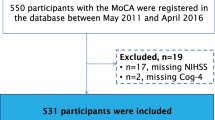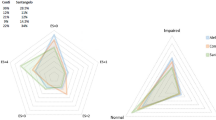Abstract
The evaluation of cognitive status is not routine in the acute stroke setting. We aimed to investigate feasibility, applicability, and performances of the Montreal cognitive assessment (MoCA) in acute stroke patients. Consecutive stroke patients (ischemic or hemorrhagic) admitted to one stroke unit were evaluated 5–9 days after stroke with MoCA (score range: 0–30; higher scores indicate better cognitive performance). Pre-morbid functional and cognitive status was assessed by a structured interview to caregivers. Neuroimaging data regarding index stroke and pre-existing lesions were collected. From December 2009 to December 2010, out of 207 patients with stroke, 137 (66 %) were enrolled [mean age 69.2 ± 14.8 years; males 62 %; mean National Institute of Health and Stroke Scale (NIHSS) score 5.9 ± 7.9]. The most common reason for non-enrolment was unfitting the time window inclusion criteria. MoCA was entirely applicable to 113/137 (82.5 %) patients and the mean score was 17.8 ± 7.1. Multivariate analyses showed that non-applicability was associated with higher NIHSS scores [OR (95 % CI) = 1.4 (1.2–1.7) for each point], left sided lesions [OR (95 % CI) = 18.8 (2.3–155.2)], and worse pre-morbid functional status [OR (95 % CI) = 0.7 (0.6–0.9) for each point of the instrumental activity of daily living scale]. Factors influencing MoCA performance were low education (β = 0.264, p < 0.01), higher NIHSS scores (β = −0.277, p < 0.01) and worse pre-morbid functional status (β = 0.504, p < 0.001). MoCA administration is feasible in acute patients with mild-to-moderate stroke, with lesion location, stroke severity, and pre-morbid functional status as major determinants of its applicability and performance. MoCA seems to reveal some degree of cognitive deficit even in patients with mild stroke.


Similar content being viewed by others
References
De Ronchi D, Palmer K, Pioggiosi P, Atti AR, Berardi D, Ferrari B, Dalmonte E, Fratiglioni L (2007) The combined effect of age, education, and stroke on dementia and cognitive impairment no dementia in the elderly. Dement Geriatr Cogn Disord 24:266–273
Pendlebury ST, Rothwell PM (2009) Prevalence, incidence, and factors associated with pre-stroke and post-stroke dementia: a systematic review and meta-analysis. Lancet Neurol 8:1006–1018
Pasquier F, Leys D (1997) Why are stroke patients prone to develop dementia? J Neurol 244:135–142
Leys D, Hénon H, Mackowiak-Cordoliani MA, Pasquier F (2005) Poststroke dementia. Lancet Neurol 4:752–759
Hénon H, Pasquier F, Leys D (2006) Poststroke dementia. Cerebrovasc Dis 22:61–70
Rasquin SM, Lodder J, Ponds RW, Winkens I, Jolles J, Verhey FR (2004) Cognitive functioning after stroke: a one-year follow-up study. Dement Geriatr Cogn Disord 18:138–144
Tham W, Auchus AP, Thong M, Goh ML, Chang HM, Wong MC, Chen CP (2002) Progression of cognitive impairment after stroke: one year results from a longitudinal study of Singaporean stroke patients. J Neurol Sci 203–204:49–52
Serrano S, Domingo J, Rodríguez-Garcia E, Castro MD, del Ser T (2007) Frequency of cognitive impairment without dementia in patients with stroke: a two-year follow-up study. Stroke 38:105–110
Duncan PW, Zorowitz R, Bates B, Choi JY, Glasberg JJ, Graham GD, Katz RC, Lamberty K, Reker D (2005) Management of adult stroke rehabilitation care: a clinical practice guideline. Stroke 36:100–143
Miller EL, Murray L, Richards L, Zorowitz RD, Bakas T, Clark P, Billinger SA (2010) American heart association council on cardiovascular nursing and the stroke council. Comprehensive overview of nursing and interdisciplinary rehabilitation care of the stroke patient: a scientific statement from the American heart association. Stroke 41:2402–2448
Hachinski V, Iadecola C, Petersen RC, Breteler MM, Nyenhuis DL, Black SE, Powers WJ, DeCarli C, Merino JG, Kalaria RN, Vinters HV, Holtzman DM, Rosenberg GA, Wallin A, Dichgans M, Marler JR, Leblanc GG (2006) National institute of neurological disorders and stroke-Canadian stroke network vascular cognitive impairment harmonization standards. Stroke 37:2220–2241
Nasreddine ZS, Phillips NA, Bédirian V, Charbonneau S, Whitehead V, Collin I, Cummings JL, Chertkow H (2005) The Montreal cognitive assessment, MoCA: a brief screening tool for mild cognitive impairment. J Am Geriatr Soc 53:695–699
Katz S, Ford AB, Moskowitz RW, Jackson BA, Jaffe MW (1963) Studies of illness in the aged. The index of ADL: a standardized measure of biological and psychosocial function. JAMA 185:914–919
Lawton MP, Brody EM (1969) Assessment of older people: self-maintaining and instrumental activities of daily living. Gerontologist 9:179–186
Pantoni L, Basile AM, Pracucci G, Asplund K, Bogousslavsky J, Chabriat H, Erkinjuntti T, Fazekas F, Ferro JM, Hennerici M, O’brien J, Scheltens P, Visser MC, Wahlund LO, Waldemar G, Wallin A, Inzitari D (2005) Impact of age-related cerebral white matter changes on the transition to disability—the LADIS study: rationale, design and methodology. Neuroepidemiology 24:51–62
Jorm AF, Jacomb PA (1989) The informant questionnaire on cognitive decline in the elderly (IQCODE): socio-demographic correlates, reliability, validity and some norms. Psychol Med 19:1015–1022
Brott T, Adams HP Jr, Olinger CP, Marler JR, Barsan WG, Biller J, Spilker J, Holleran R, Eberle R, Hertzberg V et al (1989) Measurements of acute cerebral infarction: a clinical examination scale. Stroke 20:864–870
Teasdale G, Jennett B (1974) Assessment of coma and impaired consciousness. A practical scale. Lancet 2:81–84
Amarenco P, Bogousslavsky J, Caplan LR, Donnan GA, Hennerici MG (2009) New approach to stroke subtyping: the A-S-C-O (phenotypic) classification of stroke. Cerebrovasc Dis 27:502–508
van Swieten JC, Hijdra A, Koudstaal PJ, van Gijn J (1990) Grading white matter lesions on CT and MRI: a simple scale. J Neurol Neurosurg Psychiatry 53:1080–1083
de Leon MJ, Ferris SH, Blau I, George AE, Reisberg B, Kricheff II, Gershon S (1979) Correlations between computerised tomographic changes and behavioural deficits in senile dementia. Lancet 2:859–860
Micieli G, Bottini G, Cerri C et al. (2012) Complicanze psico-cognitive dell’ictus. In: SPREAD stroke prevention and educational awareness diffusion. Ictus cerebrale: linee guida italiane di prevenzione e trattamento.7th (ed) Pierrel Research Italy SpA, Milano, pp 100–111
Pendlebury ST, Cuthbertson FC, Welch SJ, Mehta Z, Rothwell PM (2010) Underestimation of cognitive impairment by mini-mental state examination versus the Montreal cognitive assessment in patients with transient ischemic attack and stroke: a population-based study. Stroke 41:1290–1293
Godefroy O, Fickl A, Roussel M, Auribault C, Bugnicourt JM, Lamy C, Canaple S, Petitnicolas G (2011) Is the Montreal cognitive assessment superior to the mini-mental state examination to detect post-stroke cognitive impairment? A study with neuropsychological evaluation. Stroke 42:1712–1716
Dong Y, Sharma VK, Chan BP, Venketasubramanian N, Teoh HL, Seet RC, Tanicala S, Chan YH, Chen C (2010) The Montreal cognitive assessment (MoCA) is superior to the mini-mental state examination (MMSE) for the detection of vascular cognitive impairment after acute stroke. J Neurol Sci 299:15–18
Hajek VE, Rutman DL, Scher H (1989) Brief assessment of cognitive impairment in patients with stroke. Arch Phys Med Rehabil 70:114–117
de Koning I, Dippel DW, van Kooten F (2000) A short screening instrument for post-stroke dementia: the R-CAMCOG. Stroke 31:1502–1508
Rossetti HC, Lacritz LH, Cullum CM, Weiner MF (2011) Normative data for the Montreal cognitive assessment (MoCA) in a population-based sample. Neurology 27:1272–1275
MacKenzie G, Gould L, Ireland S, LeBlanc K, Sahlas S (2011) Detecting cognitive impairment in clients with mild stroke or transient ischemic attack attending a stroke prevention clinic. Can J Neurosci Nurs 33:47–50
Toglia J, Fitzgerald KA, O’Dell MW, Mastrogiovanni AR, Lin DC (2011) The mini-mental state examination and Montreal cognitive assessment in persons with mild subacute stroke: relationship to functional outcome. Arch Phys Med Rehabil 92:792–798
Blackburn DJ, Bafadhel L, Randall M, Harkness AK (2012) Cognitive screening in the acute stroke setting. Age Ageing. doi:10.1093/ageing/afs116
Nys GM, van Zandvoort MJ, de Kort PL, Jansen BPW, de Haan EH, Kappelle LJ (2007) Cognitive disorders in acute stroke: prevalence and clinical determinants. Cerebrovasc Dis 23:408–416
Acknowledgments
This study did not receive any corporate, governmental or institutional funding.
Conflicts of interest
All authors declare no conflict of interest.
Ethical standard agreement
This study was approved by the local ethics committee.
Author information
Authors and Affiliations
Corresponding author
Rights and permissions
About this article
Cite this article
Pasi, M., Salvadori, E., Poggesi, A. et al. Factors predicting the Montreal cognitive assessment (MoCA) applicability and performances in a stroke unit. J Neurol 260, 1518–1526 (2013). https://doi.org/10.1007/s00415-012-6819-5
Received:
Revised:
Accepted:
Published:
Issue Date:
DOI: https://doi.org/10.1007/s00415-012-6819-5




